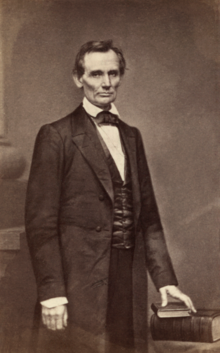クーパー・ユニオン演説
この記事は英語版の対応するページを翻訳することにより充実させることができます。(2021年2月) 翻訳前に重要な指示を読むには右にある[表示]をクリックしてください。
|

クーパー・ユニオン演説(クーパー会館演説、Cooper Union speech or address, known at the time as the Cooper Institute speech[1])とは、1860年2月27日にエイブラハム・リンカーンがニューヨーク市のクーパー・ユニオンで行った演説。このときリンカーンはまだ共和党の大統領候補に指名されてはいなかったが、1860年の共和党大会(en)が同年5月に予定されていた。リンカーンの行った演説の中でも重要とされるものである。後年の大統領選挙における勝利もこの演説のおかげだという歴史家もいる[2]。
演説において、奴隷制に対する見解を練り上げ、西部諸州に対する適用拡大への反対を繰り返し、それは建国の父たちの精神に沿うものであることを主張した[3]。
ジャーナリストのロバートJ.マクナマラは次のように書いている。「リンカーンのクーパーユニオン演説は彼の演説においても最良部類に入るもので、7,000字を超えたものであった。あくまで彼の一節を伴って引用される多くのスピーチの1つにすぎない。それでもリンカーンはこの演説に際し入念に研究して活発な議論を呼び起こし、驚くほどの効果を挙げた[3]。」
背景
[編集]概要
[編集]主な抜粋
[編集]「南部の人々へ」を取り上げたセクション
[編集]「共和党員に」宛てのセクション
[編集]伝記
[編集]
参考文献
[編集]- ^ Barondess, Benjamin (1953). Lincoln's Cooper Institute Speech. The Civil War Round Table of New York, Inc.. p. 6-7. LCCN 54-1460. "His[Lincoln's] first stop was at Chicago. There, he went to visit his friends Joseph Medill and Charles Ray, publisher and editor-in-chief of the Chicago Tribune. On arrival in their office Lincoln produced the manuscript of his proposed speech, written on blue foolscap, and asked them for their comments on his phraseology and use of words. ... Medill and Ray set to work on Lincoln's manuscript and kept at it for hours. They soon amassed a great number of proposed corrections. ... When Lincoln arrived, they handed him a large batch of notes setting forth the corrections they recommended. He glanced through them hurriedly, expressed his thanks, told a few funny stories, and left for New York. After the Cooper Institute speech had been delivered, the New York newspapers arrived, with the text of the address, as delivered. Medill and Ray read it through carefully. When they had finished, Ray said: "Medill, old Abe must have lost out of the car window all our precious notes, for I don't find a trace of one of them in his published talk here." Medill replied: "This must have been meant for one of his waggish jokes.""
- ^ Holzer, Harold. Lincoln at Cooper Union: The Speech That Made Abraham Lincoln President. p. 1. ISBN 0-7432-9964-7 March 12, 2016閲覧. "[H]ad he not triumphed before the sophisticated and demanding audience he faced at New York's Cooper Union on February 27, 1860, Lincoln would never have been nominated, much less elected, to the presidency that November."
- ^ a b “Lincoln's Cooper Union Address Propelled Him to the White House. A Speaking Engagement in New York City Makes an Illinois Lawyer a Political Star”. About.com (A part of The New York Times Company). February 24, 2011閲覧。


 French
French Deutsch
Deutsch